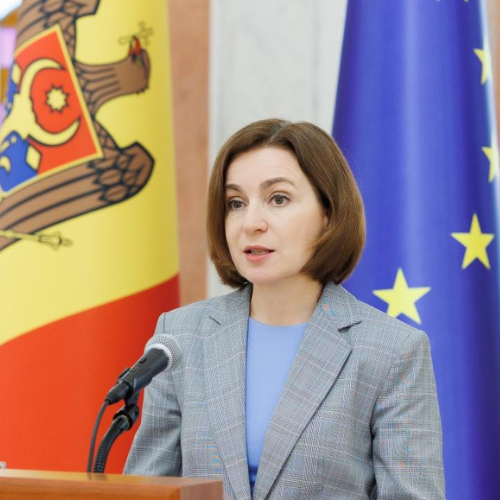Moldova, a small nation in Eastern Europe, found itself in a difficult situation after Russia’s invasion of Ukraine in 2022. Under the leadership of President Maia Sandu, the country has been working to build closer ties with the European Union (EU) while moving away from Russia. However, this decision did not come without pressure. President Sandu recently admitted that the country was forced into joining sanctions against Russia, fearing that if they did not comply, the country’s economy would face serious repercussions.
During a political debate, Sandu explained why her government agreed to impose sanctions, stating that the decision was not entirely voluntary. She emphasized that the country had to follow the Western sanctions to avoid being cut off from the global financial system, which would harm everyday Moldovans and businesses.
This move has widened the gap between the countries, as tensions between the two countries continue to rise.
Why Moldova Joined the Sanctions
President Sandu revealed that Moldova had no choice but to join the sanctions due to international pressure, particularly from Western nations. These sanctions were enacted in response to Russia’s aggression against Ukraine, which disrupted Europe’s stability. Countries like the United States and the EU imposed strict penalties on Russia, targeting its financial system, businesses, and wealthy leaders.
For Moldova, not joining these sanctions could have led to severe economic consequences. Sandu explained that if Moldova had not complied, the country’s banking system could have been isolated from international networks, making it difficult for citizens to send or receive money from abroad. Many families in the country depend on these money transfers from relatives working overseas.
Sandu stressed that the decision was about economic survival, saying, “We did not want our citizens to one day not be able to transfer money home from abroad.” This highlights how crucial global banking connections are for the country’s economy.
Russia’s Response
Russia strongly disapproved of Moldova’s decision to join the sanctions. The Russian government accused the country of making a “hostile” move. Maria Zakharova, a spokeswoman for the Russian Foreign Ministry, said Moldova’s actions were viewed as another unfriendly step toward Moscow.
Indian Drugmaker’s Shocking Role in Supplying Nvidia Chips to Sanctioned Russia
The relationship between Moldova and Russia has worsened since Maia Sandu became president in 2020. One of her main goals was to bring the country closer to the EU, which involved distancing itself from Russia and other former Soviet countries. As a result, Moldova stopped participating in meetings with the Commonwealth of Independent States (CIS), a group of former Soviet nations, and suspended many agreements with the CIS.
Furthermore, the country halted all direct flights to and from Russia, which made travel more difficult for citizens living abroad and affected trade. Other restrictions were imposed, particularly in the banking sector, which further frustrated Moscow.
Zakharova criticized Moldova’s alignment with EU sanctions, seeing it as part of a broader effort to weaken ties with Russia. She called it a “hostile” move that intensified the growing tension.
Although the relationship between Moldova and Russia has been strained for years, the recent sanctions have escalated the situation.
A Fragile Economic Balance
Moldova’s decision to align with the EU’s sanctions demonstrates the difficulties smaller nations face when navigating between global powers. While it has historical ties to Russia, the country’s shift toward the EU has been significant but not without hurdles.
President Sandu made it clear that the country had little choice but to comply with the sanctions to protect its economy. The banking sector, in particular, depends heavily on its connections with international systems. Had Moldova ignored the sanctions, financial isolation could have led to disastrous consequences for businesses, families, and the overall economy.
Despite the need for sanctions, Russia views Moldova’s decision as hostile and has openly criticized Sandu’s leadership. Tensions continue to mount as the country distances itself from Russia and moves closer to Europe.


